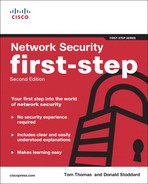Chapter 7. Firewalls
“Courage is resistance to fear, mastery of fear—not absence of fear.”
—Mark Twain
By the end of this chapter, you should know and be able to explain the following:
• Who needs a firewall, and why firewalls are used to protect network resources
• How a firewall is a technological expression of your organization’s written security policy
• When a DMZ is appropriate and the security benefits you gain by deploying a firewall with a DMZ
Answering these key questions enables you to understand the overall characteristics and importance of network security. By the time you finish this book, you will have a solid appreciation a firewall’s role, its issues, how it works, and why it is so important to the security of your network.
The Internet is an exciting and wonderful place to browse and explore. It has been likened to the Wild West, The Great Frontier, and other grandiose achievements of mankind. In reality, the World Wide Web is merely a collection of routers and servers that make up the largest WAN in recorded history. This collection of networking gear provides mail servers, websites, and other information storage and retrieval systems and is all connected to the Internet and accessible to every person who is also connected. It has even been said that the Internet will contain the collective institutional knowledge of mankind, eventually. Entire books have been written on the Internet’s potential and its impact on our lives—rest assured that this is not one of those books. But it does make you ponder just how much of your life is out there already that you might or might not be aware of.
We are concerned with a network’s security, so we must ask what kinds of safeguards are in place to protect such an unbelievable amount of information. Is there some organization that polices the Internet much in the same way that law enforcement cruises the highways? How about a governmental agency that snoops around and double-checks every possible device connected to the Internet? The answer to these questions is no; there is no unifying organization responsible for protecting the Internet.
The job of securing and protecting the gateways of the Internet’s knowledge is left up to the person or persons responsible for the Internet connection and network hardware/software, such as the router, firewall, switch, server operating systems, application, and so on. This person or persons are tasked with the job to ensure that hackers (the bad guys) do not make a mess of the carefully stored and catalogued information in question. And just how can you protect a website, mail server, FTP server, or other information sources accessible from the Web?
The answer is one word—firewall. The sole purpose of these dedicated hardware devices is to provide security for your network. A firewall is a security device that sits on the edge of your Internet connection and functions as an Internet border security officer. It constantly looks at all the traffic entering and exiting your connection, waiting for traffic it can block or reject in response to an established rule. The firewall is the law and protection in the lawless wild wild web. A firewall is ever vigilant in its mission to protect the network resources connected to it.
The Internet has made so much information available to individual users as, over the years, access to this information has evolved from an advantage to an essential component for both individuals and businesses. However, making your information available on the Internet can expose critical or confidential data to attack from everywhere and anywhere in the world—the Internet is literally a worldwide network. This means that, when you connect to the Internet in Madison, Mississippi, you can be subject to attacks from Europe, Asia, and Russia—literally any device connected to the Internet anywhere on the earth, which is kind of disturbing. Firewalls can help protect both individual computers and corporate networks from hostile attacks from the Internet, but you must understand your firewall to correctly use it.
This 24-hour/365-day-a-year “electronic Robocop” has an important job: to keep the bad guys out and let the good guys get to the resources they need to do their jobs. Sounds simple, right? On paper, it sounds like a walk in the park, but in reality, properly configuring a firewall is far from easy.
In some cases, a badly configured or feature-inadequate firewall can be worse than no firewall at all. This is difficult to believe, isn’t it? Nonetheless, it is true. This chapter dissects a firewall’s duties to understand what makes a firewall operate and how it does its job.
